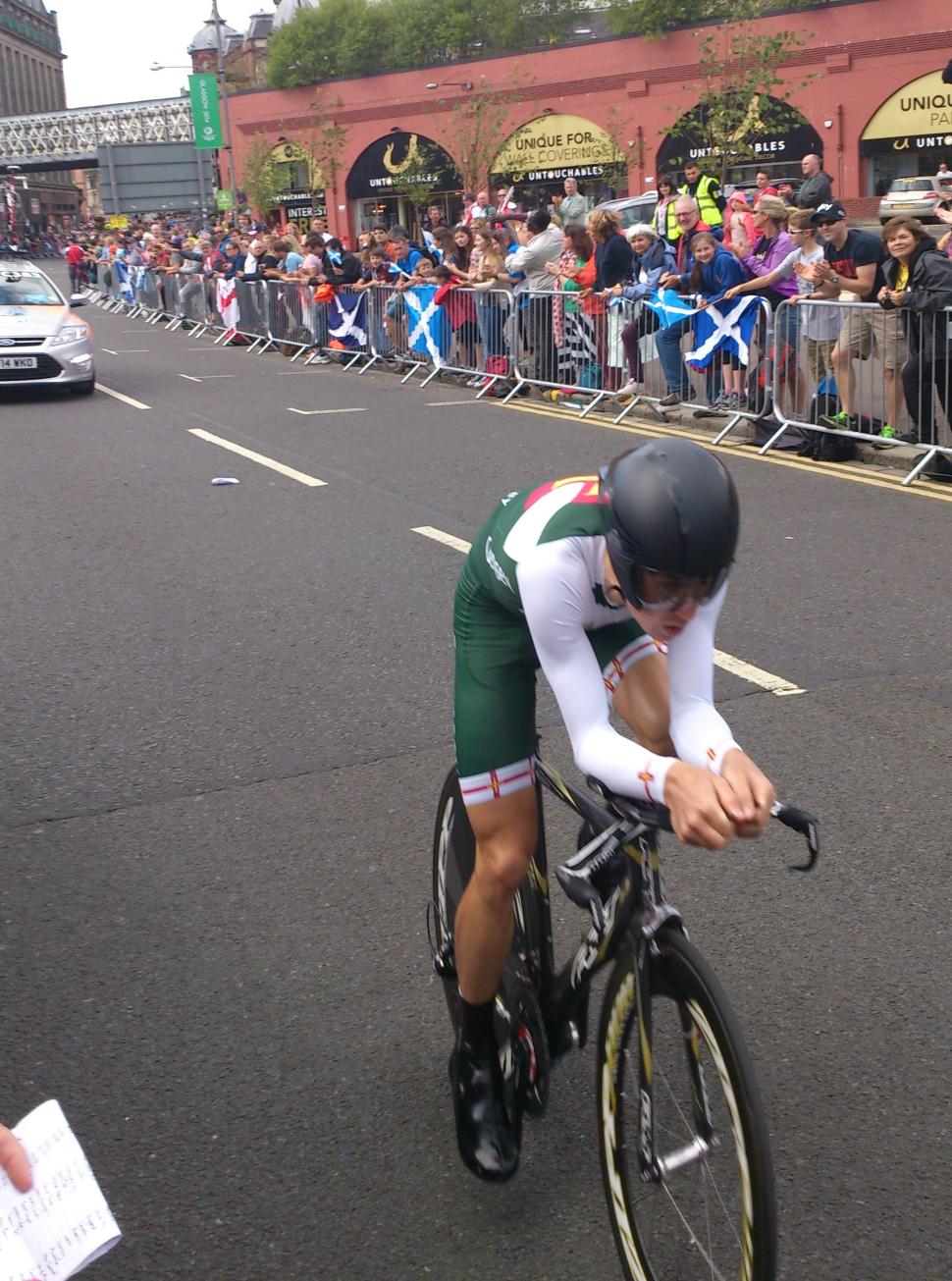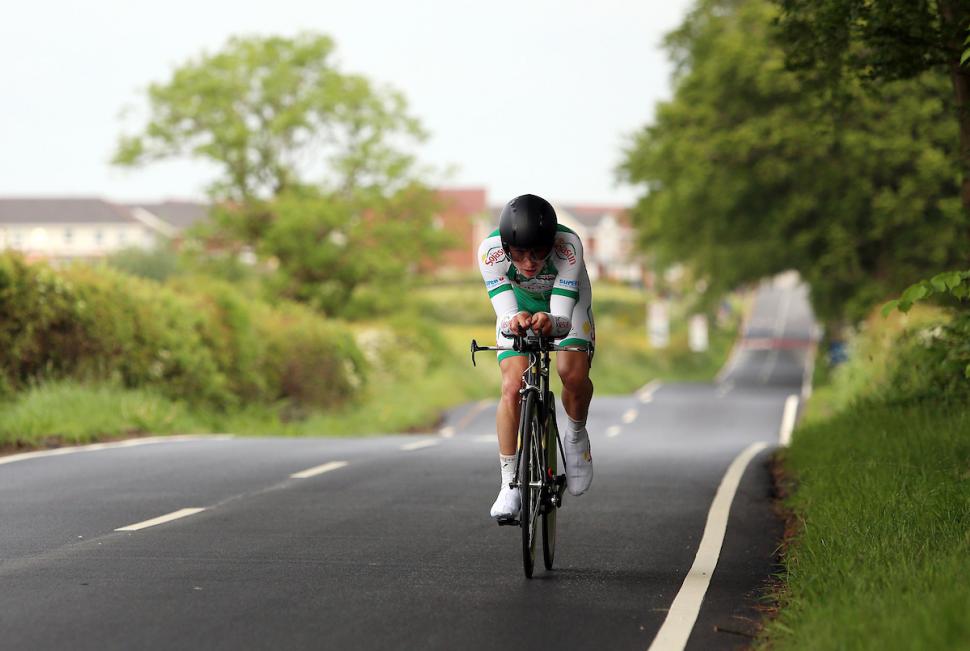A former professional cyclist who says his ambitions of returning to elite racing and riding the Tour de France were wrecked after a dooring incident in London is suing for over £1 million in damages, telling a court that the crash left him with long-term physical and psychological trauma — including a suspected brain injury.
James McLaughlin, who represented Guernsey at the Commonwealth Games in 2014 and 2018, was working as a courier and riding along a cycle lane in West Wickham, south-east London, in May 2020 when a car passenger opened her door into his path, causing a heavy crash that fractured his shoulder and right elbow.
Now aged 34, the former national-level time trialist and stage racer says the impact has been devastating — both physically and mentally. His legal team told Central London County Court that McLaughlin suffers from memory loss, fatigue, depression, anxiety, and PTSD stemming from the incident.
He is supported by an emotional assistance dog and is seeking more than £1 million from the insurers of both the driver and the passenger.
While liability for the dooring has already been admitted, the case now centres on whether McLaughlin suffered a “mild traumatic brain injury” in the crash and the scale of compensation he is entitled to.
The court heard that McLaughlin did not report a direct blow to the head at the time, but a neuropsychologist later concluded that the shaking impact of the crash likely caused concussion, with lingering effects, The Independent reports.
> Dublin food delivery cyclist settles for €60,000 over dooring by driver parked in cycle lane
His barrister, Winston Hunter KC, argued that McLaughlin “has lost that cycling career,” saying he had planned to return to professional racing after a temporary pause.
He also argued that at the time of the crash, McLaughlin was “supremely fit” and had “clocked up a number of recent successes,” including his sixth-place finish in the time trial at the 2018 Commonwealth Games — achieved despite riding through injury.
 James McLaughlin at the road time trial, 2014 Commonwealth Games (credit: Cs-wolves – Own work)
James McLaughlin at the road time trial, 2014 Commonwealth Games (credit: Cs-wolves – Own work)
McLaughlin’s racing record included multiple top ten finishes in the British National Time Trial Championships (fifth in 2014, seventh in 2013), fourth in the U23 version of the event in 2010, and top results internationally, such as fifth overall at the Cinturón Ciclista Internacional a Mallorca in 2011, tenth at the Chrono des Nations in 2015, and fourth at GP Kranj in 2016.
His strong 2014 season — including a 10th-place finish in the time trial at the 2014 Commonwealth Games, finishing as the highest-ranked rider not contracted to a WorldTour team — eventually earned him a contract with British Continental squad Madison Genesis the following year.
At the pre-trial hearing, barristers for the insurers challenged the claim of brain injury, with Lionel Stride arguing there was “no mention of a blow to his head” and that McLaughlin’s physical injuries were limited to the shoulder and elbow.
However, Judge Jane Evans-Gordon allowed McLaughlin’s team to submit further neurological evidence, describing it as “a very significant issue” with potential implications for the final compensation amount.
“It could make a difference of approaching £400,000 to his loss of earnings claim,” she said, also noting that the psychological problems presented — including PTSD and phobic anxiety — and the fact that they had not significantly improved despite treatment.
“If his psychological symptoms have a non-organic cause, then they are likely to resolve in due course,” she said. “If, however, the cause is organic, namely a mild traumatic brain injury, they will not improve and are likely to have a significant impact on his future earning potential.”
The full trial is expected to be delayed to allow time for the new expert evidence to be submitted.
McLaughlin’s case comes amid growing concern around the safety of cycle lanes and the risks posed by “dooring”, where a driver or passenger opens a vehicle door into the path of a cyclist, often giving them no time to react. According to Cycling UK, at least 500 cyclists are injured in dooring incidents in Britain each year, though the true number is likely far higher.
In December, double Olympic gold medallist and world time trial champion Remco Evenepoel was knocked off his bike after colliding with the swinging door of a bpost postal van in Belgium. He suffered fractures to his shoulder blade, ribs and hand, along with a dislocated clavicle and lung contusions.
Evenepoel later joined forces with the Belgian postal service to launch the Remco Reflex, a national campaign encouraging motorists to use the “Dutch Reach” — a technique where people open doors with their far hand, forcing them to turn their body and look behind for passing cyclists.
Remco Evenepoel, 2023 UCI Cycling World Championships (Alex Whitehead/SWpix.com) (credit: road.cc)
Despite surgery and an intense recovery, Evenepoel continued to struggle with injuries into 2025. After abandoning this year’s Tour de France on stage 14, he revealed that he’d raced with lingering fatigue as a result of his crash, saying: “I always felt like I was playing catch-up… I never quite felt like myself.”
In 2022, four-time Tour de France winner Chris Froome was doored while training near his home in Monaco, sustaining minor injuries. He later used the incident to promote awareness of the Dutch Reach, saying: “It’s extremely helpful and causes a lot less pain to our cyclists. It’s a very simple thing for you guys to do.”
Earlier this month, a Dublin food delivery cyclist received €60,000 in a court settlement over a dooring incident that occurred in December 2018.
Virgilio Almeida Cardoso Neto had been working for Uber Eats when a driver, partially parked in a cycle lane on Crumlin Road without hazard lights or brake lights, opened their door directly into his path. The crash fractured Neto’s finger, requiring surgery under general anaesthetic, and he told the court the driver initially refused to provide any personal details.

